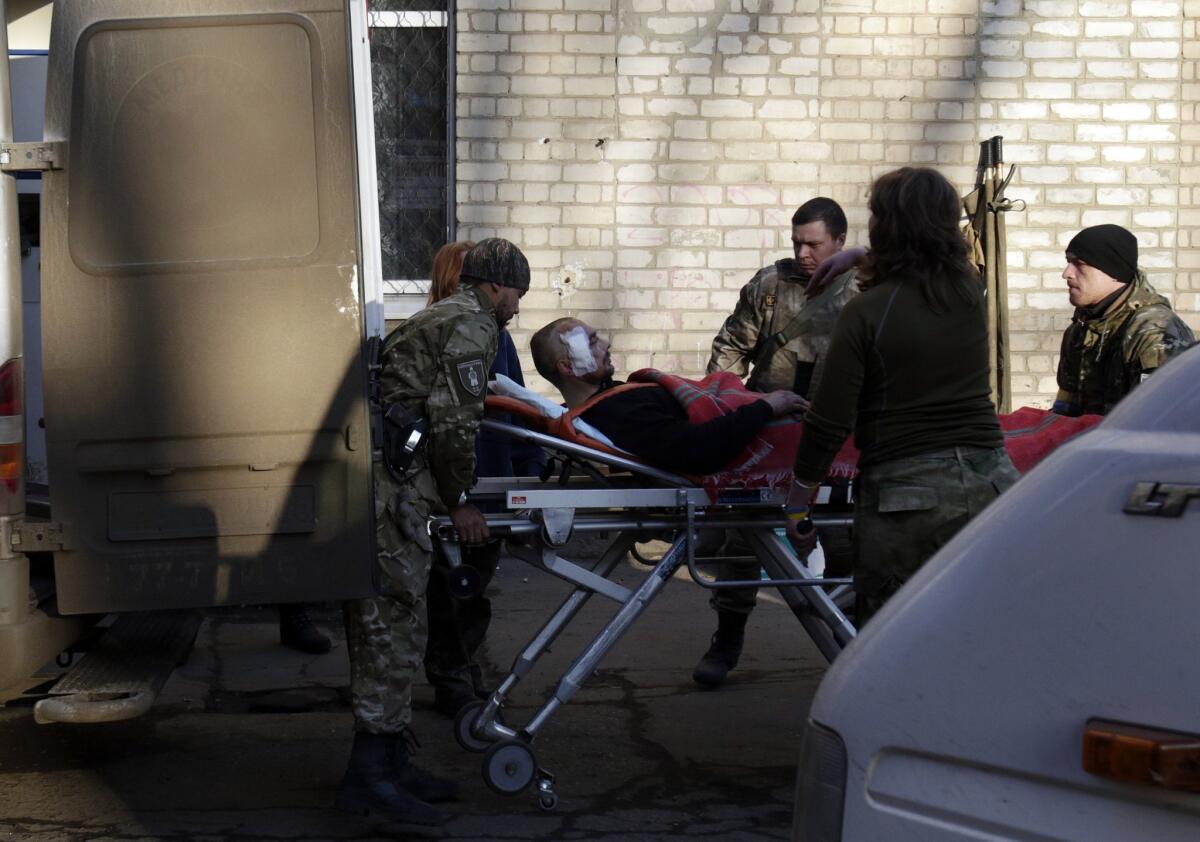Ukraine fighting surges ahead of cease-fire, at least 25 killed

- Share via
Massive artillery barrages hit a strategic railway junction in eastern Ukraine on Friday as Russia-backed separatists intensified their efforts to take Debaltseve from Ukrainian government forces ahead of the Sunday start of a cease-fire, Ukrainian officials reported.
At least 25 people were killed in the day following agreement by the combatants and the presidents of Ukraine and Russia on Thursday. The dead included 11 government troops, seven separatist fighters and seven civilians, sources on both sides said. Dozens more were wounded in the shelling.
The upsurge in fighting and casualties reflected a last-ditch effort to take or recover territory before all guns are supposed to fall silent at one minute after midnight Sunday local time.
Government forces and separatists have been battling over the Debaltseve junction for weeks. It is in government hands but keenly coveted by the separatist forces as it is a vital link between their strongholds in Donetsk and Luhansk.
Dozens of rockets and mortars landed in and around the town that was once home to 25,000 but has been abandoned by all but about 3,000 holdouts who have been weathering the bombardments in frigid basements with little food, water and electricity.
Ukrainian officials have accused Russia of sending in massive reinforcements in recent days, including a convoy of 70 armored personnel vehicles and mounted guns. On Friday, Deputy Defense Minister Petro Mekhed said Moscow had deployed at least 10,000 soldiers to the Ukraine conflict.
“There is a tendency to raise the number of military personnel. More than 10,000 representatives of Russia are in Ukraine today,” Mekhed told the Ukrinform news agency. “I can honestly say that representatives of the Russian Federation are lying. They are not only supplying weapons to separatists but they are also directly and actively participating in the fighting.”
Russian President Vladimir Putin has repeatedly denied involvement in the Ukraine conflict, in spite of NATO satellite surveillance photos showing armored columns crossing from Russia into Ukraine and confessions by captured Russian soldiers that they were deployed to the fight. Putin has said only “volunteers” from Russia have gone to the aid of their brethren in eastern Ukraine.
Putin and Ukrainian President Petro Poroshenko negotiated with German Chancellor Angela Merkel and French President Francois Hollande for 16 hours on Wednesday and Thursday to craft a new cease-fire and peace plan for the 10-month-old shooting war in eastern Ukraine. The truce sets out the same timetable and disarmament objectives outlined in a Sept. 5 peace accord that the warring factions then promised to fulfill but didn’t.
The peace plan agreed to Thursday in the Belarus capital of Minsk calls for the cease-fire to begin Sunday, with heavy weapons and foreign fighters to be withdrawn within two weeks and elections to be conducted under Ukrainian law in the separatist-held regions, which are supposed to be granted more autonomy by the Ukrainian parliament by the end of the year.
The Kiev government is to recover control of the Ukraine-Russia border now in separatist hands, but contingent on the constitutional changes granting the country’s diverse regions more say over their finances, foreign relations and cultural matters.
By setting the new cease-fire 60 hours after the midday Thursday agreement, the European brokers appear to have triggered a race by both sides to conquer as much of the contested territory as they can before they are due to lay down their arms.
Thousands of Ukrainian government troops called up in a major mobilization last month were deployed to Debaltseve to strengthen Kiev’s hold on the important transport hub. But those troops have reportedly been surrounded by separatist fighters also recruited en masse since fighting intensified after a brief lull over the Christmas and New Year holidays.
The fighting in eastern Ukraine broke out last April, after Russian paratroopers descended on Ukraine’s Crimea peninsula and took over government offices and military bases. The Kremlin annexed the region on March 18, provoking international condemnation. The separatists occupying Donetsk and Luhansk regions have proclaimed them independent republics, and some have said they want to join the Russian Federation.
Thursday’s cease-fire made no mention of the purported “people’s republics,” reflecting the international community’s rejection of their legitimacy. But the accord also made no mention of the status of Crimea, which Ukrainian lawmakers have insisted must be restored to Kiev’s rule before any constitutional changes can be undertaken to enhance regional autonomy.
Other provisions of the new peace plan have also been rejected by the combatants. Ukrainian Foreign Minister Pavlo Klimkin said Friday that its call for amnesty on both sides won’t apply to those in the separatist ranks whose actions constituted “crimes against humanity.”
Andrei Purgin, the self-styled parliamentary leader of the Donetsk People’s Republic, told Russia’s Tass news agency that Klimkin’s remark showed that Ukraine has no intention of implementing the Minsk peace plan.
Russia’s Sputnik news agency cast the Minsk agreement as a victory for Putin in securing separatist control over the occupied territory and achieving his aim of forcing decentralization of the Ukrainian government, giving de facto independence to the restive regions.
Putin has vociferously demanded that Ukraine be transformed into a loose federation of autonomous regions, with the apparent aim of gaining a say through his separatist proxies in important decisions of the Ukrainian government over matters like whether the country should seek European Union and NATO membership. The Kremlin opposes Kiev reorienting its economic and security relationships from Russia to the West.
Follow @cjwilliamslat for the latest international news 24/7
More to Read
Sign up for Essential California
The most important California stories and recommendations in your inbox every morning.
You may occasionally receive promotional content from the Los Angeles Times.














